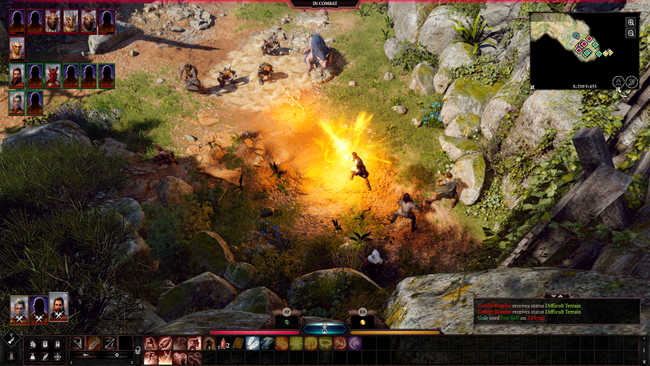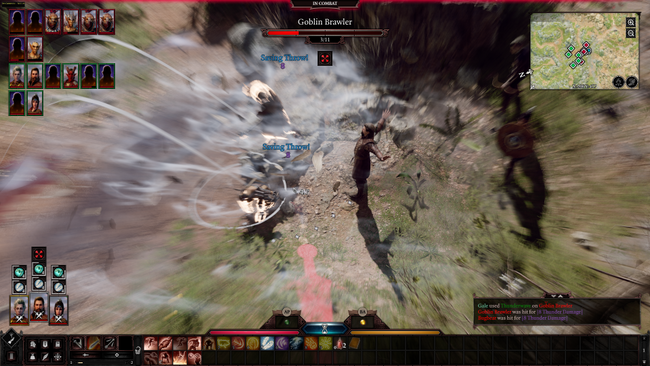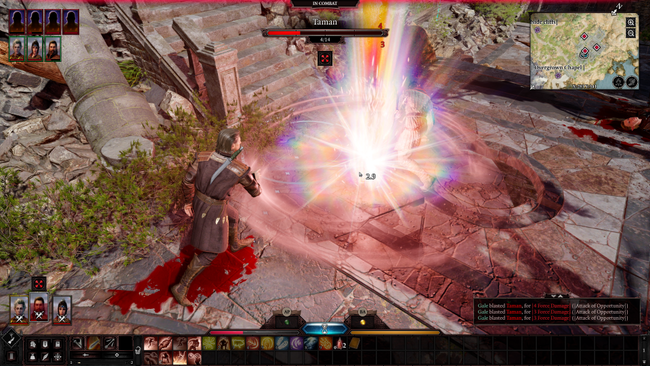
Baldur's Gate III Interview: Discussing Combat and Gameplay with Larian Studios designer Matt Holland
Larian Studios today debuted the first public gameplay demo for Baldur's Gate III at PAX East in Boston, showing the world a new look to a classic RPG series with the studio's own signature flair. Gone is the classic Baldur's Gate real-time combat and in is a new turn-based system.
Prior to the public PAX East demo, we had a chance to see the game in action during an extended hands-off demo with Larian. During the event, we also had a chance to speak with Combat Designer Matt Holland, who previously worked as a gameplay scripter and designer on Larian's Divinity: Original Sin 2. We talked about combat design, player creativity, being true to the Dungeon & Dragons style, and more.

RPG Site: When I saw the demo for Baldur's Gate III earlier today, it's clearly very different from the classic games in that it seems much more tactical. The classic games used a real-time with pause (RTWP) system and this feels like a more of a more strategic take on combat. Larian's previous titles, the Divinity Original Sin games, use a turn-based system where characters act individually in a set turn order. The system in Baldur's Gate III seems more like team-turn-based or phase-based system. Why did you want to approach it that way?
Matt Holland: So first off, Dungeon & Dragons is inherently turned based. And we worked on Original Sin which is also turn-based, and it basically just made sense to go in that direction. We found combat to be the most fun using that system. When it comes to team turns versus D:OS's initiative system -- although BG3 still does use an initiative system, it's kind of the team that scores the highest initiative gets to go first -- we just give each team their own turns. We felt as we were playing and testing out these new ways of doing our combat was that this phase system ended up with the end result of being much snappier and faster in combat, especially in multiplayer. Because you no longer do you have to wait for me to do my move in order to do your's, you can all act at the same time. Combat is nice and faster and snappier. You're going to notice that you can have these bigger encounters and still have that support and not have it take 45 minutes.
RPG Site: But of course, if you wanted to slow things down and think things over..
Holland: Yep. Everything is turn-based and you'll have as much time as needed to strategize as you want. We also found that if you're playing with other people, having a team turn really promotes more collaboration, how you want to spend your actions and create combinations to great effect with each other.
RPG Site: I'd imagine that having team-based turns would be a bit more flexible. Rather than something like Divinity where it's <this person's> turn and they have to do something or skip. Now it's more, okay, it's my team's turn. And for example, sometimes you might have your healer go first in a turn, but sometimes you might have them go last, depending on what you need to happen that turn.
Holland: Exactly, it's not quite as rigid as a purely individual turn-based system.
RPG Site: You mentioned multiplayer and it was mentioned a few times in the presentation briefly. I was just curious, how does multiplayer work, functionally?
Holland: So if you and your friend were to start a game together, and let's say I created the game. You would jump into my party and I can assign however many party characters for you to play with. It's not like a system where you can take a character from a separate game you started and jump into mine. If we both want to start playing the game and start a new campaign together, we can both go into character creation. So if we want to make 2+ custom characters, we do that and play from there.
RPG Site: So like a session of Dungeons and Dragons.
Holland: Yeah, exactly. It's drop-in drop-out multiplayer as well. So, for example, if we're playing together but I have to run off to work, it doesn't necessarily mean the game has to stop. It just means that now you get to take control of my character.

RPG Site: Concerning the turn-based mechanics. When I think of classic Baldur's Gate, I sometimes think of those low-level trash mob encounters where your party can just mostly deal with enemies in real-time without much input from the player - the characters can just kind of take care of it themselves. But in a turn-based style, the player has to dictate every action in every battle. How do you make sure that the pace of the game doesn't suffer too much and that you're not spending so much time setting up turns?
Holland: A lot of this goes back to the team turns, which spends up the pace compared to something like D:OS 2 turns. But also, we're considering a few other things like making sure our animations are faster and that the enemies execute their actions quickly. We wanted a system where we could give players as much time as you want to plan out your actions, but when it actually comes to executing them, it's nice and fast and snappy. In that same vein, with RTWP games, in some combat players would effectively do the same thing and pause to consider their moves.
RPG Site: RTWP systems can be a little bit awkward, especially in tougher combat situations if you're just pausing all the time. In a way, you're almost effectively making it a turn-based pace anyway.
Holland: I think that it's somewhat a misconception that turn-based necessarily means slower gameplay. With the smaller encounters especially, they'll come and go quickly. Once you know all your character abilities & spells and you know what they can do, some encounters will go by quickly.
RPG Site: Let's say you're revisiting an early section of the game where the enemies aren't so tough anymore and maybe not even worth fighting. How do you make sure the player isn't running into too many trivial encounters that just eat up time and bog the game down too much?
Holland: The nice thing about our system is that every situation we set up so that there are ways to get around combat. You talk your way out. You can sneak around the area entirely. If it does come to combat, what we always try to do is make sure that - like a D&D or tabletop game - even an encounter with a few goblins can turn deadly if you don't play your cards right. The goblins have tricks up their sleeves too. So even if it is a lower level encounter, it doesn't necessarily mean it's going to be easy.
RPG Site: A more specific question here. What are your options for Saving the game, or will there be any sort of component to redo or nullify movements in battle if you accidentally make a bad decision? Can you rewind a turn in any way? Or are you kind of stuck with the rolls you get in and the decisions you make?
Holland: You can save whenever, certainly, either during dialogues or in combat. There isn't any sort of turn rewind function, but we didn't want to take away that sort of option from the player to save often. If that's how they want to play, they can do that.

RPG Site: In designing the encounters in the game, especially the later stages, what tricks do you use to keep combat interesting and keep battles fresh and engaging? How do you prevent things from feeling just stale or routine?
Holland: Well I wouldn't want to spoil too much on what we're gonna be doing. I guess the main thing is: we ask ourselves how do we add spice to the encounter that people are going to remember? And thankfully, with D&D especially, there is just a wealth of resources out there - people trying different things. Whether you go onto D&D forums or Reddit and see how other DMs have used creatures in their encounters - you're never starved for ideas. And top of that, there are ideas we've wanted to do for a while in our boss encounters which can even throw high-level characters for a loop. So between what we're doing and what other teams have done in the past, there is a lot we can do.
RPG Site: So not just higher HP bars and more damage.
Holland: No no no no, certainly not. Hah. Well, some later enemies certainly will have pretty big HP bars, but more importantly, your party is going to have more capability to do more actions and do more difficult things. So it's basically creating bosses that can react to how you players can use your skills.
RPG Site: Will every enemy in the game have set stats and levels? Or is there going to be as any sort of number scaling at all?
Holland: Scaling? No no.
RPG Site: I figured, but I wanted to be sure! Is there anything else you want to say about the combat that you haven't touched on yet?
Holland: One thing that we definitely focused on is how much we want to try to reward the player for being creative. It's the same way we approach all of the different quest situations in our game - we want to give the player as much opportunity to role-play as possible. We do this through a lot of systems across the board and giving the player their options. So especially with a system that revolves around rolls of the dice, right, what ends up happening systems is that the player has to play a game of risk mitigation. 'How do I make sure I'm not under the thumb of a dice roll and having that purely decide my fate?' So what we do is we try to get as many opportunities to take advantage of the battlefield - before or even during combat. Like in the demo you saw in the chapel fight? Before the fighting began, [Larian boss] Swen separated and positioned his characters in order to give himself the upper hand right away.
RPG Site: You don't want a bad dice roll here or there to decide your fate. In a game like this, I'd want there to be enough flexibility where even if some of my decisions or actions don't work perfectly I'm not totally screwed.
Holland: Exactly. This actually goes back to the creativity right? You're really limited to how creative you can get. Just because you rolled a 1 doesn't mean the combat's over. You saw in the demo that many things didn't quite go as planned. We oftentimes are able to get the boss down into the spider pit, but even though we weren't able to in your demo, we still came away with the win. Not just dice rolls even, there were a few tactical misplays as well (laughs) but we were able to turn the battle to our favor.

RPG Site: I'd imagine creativity is also where things like the larger focus on level verticality come into play, like the rafter, and various environmental interaction like the chandelier in the demo. It's not just what you are fighting, but also where.
Holland: You can fight for example the same five goblins here and five goblins there, but if the level design is altered one way or another, the fight can play out to a very different degree. The number of options given to the playerbase in the environments alone can make a load of difference.
RPG Site: There was also one battle in the demo where there were a few NPCs that the player had to try and keep alive. An objective like that also can change up the way you approach combat. Do you plan on having a lot of those?
Holland: Um, they're sprinkled in, but I wouldn't say a lot. It's always a balancing thing but I mean, you may want to protect the character but maybe you don't care about that, or if you're role-playing a more evil character, yeah, let the NPC be bait. But indeed, there might be situations where a potential quest giver could die in a battle and the following scenes and storyline will change whether or not that character is still present.
RPG Site: Thank you for your time.
Baldur's Gate III is planned for a Steam Early Access Release later this Summer.